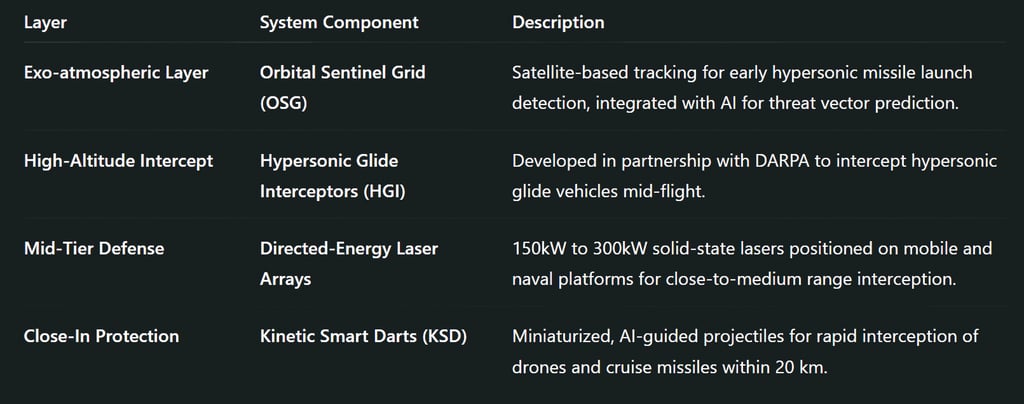
US President Unveils “Golden Dome” Missile Defense System: A Multi-Layered AI-Powered Shield for Modern Warfare
On Tuesday, the US president introduced the “Golden Dome” missile defense system—an advanced, AI-driven, multi-layer shield designed to counter hypersonics, drones, and next-gen missile threats. Here's a full comparison with Iron Dome, THAAD, and others.
USAPOLITICAL JOURNEYARMY/NAVY/AIRFORCEGLOBAL ISSUESNEPOTISM/SOCIAL ISSUES
---
5/23/20253 min read


On Tuesday, the President of the United States unveiled a groundbreaking national security initiative: the "Golden Dome" missile defense system. Designed as a next-generation shield against aerial threats, this system aims to integrate AI, laser interceptors, and hypersonic tracking technologies to provide an unprecedented level of defense against missiles, drones, and other airborne attacks.
The announcement comes at a time when geopolitical tensions are intensifying and traditional missile defense systems face growing limitations. The Golden Dome, if successfully implemented, could redefine the way the US and its allies protect themselves from modern aerial warfare.
Historic Announcement: “Golden Dome” Missile Defense System
In a nationally televised address from the Pentagon on Tuesday, the President of the United States announced the development of a next-gen missile defense architecture named the “Golden Dome.” This advanced system represents a multi-domain, AI-integrated approach to protecting U.S. soil and global military assets against increasingly complex airborne threats.
Backed by cutting-edge research from DARPA, NASA, and key defense contractors such as Lockheed Martin, Raytheon, and Northrop Grumman, the Golden Dome is being hailed as the most ambitious and transformative missile defense program in U.S. history.
What Sets Golden Dome Apart?
Unlike legacy systems that operate in siloed layers (ground-based or sea-based), the Golden Dome is a fully fused defense ecosystem integrating land, air, sea, and space-based defense nodes into a synchronized real-time response network.




Advanced Capabilities
Neural Defense Grid (NDG)
Golden Dome will be powered by the Neural Defense Grid, a military-grade AI that self-trains using live combat data, war games, and satellite surveillance. It can predict, reroute, and reassign interception protocols autonomously.
Cyber-Hardening Framework
All layers will be protected with post-quantum encryption and zero-trust architecture, shielding the system from cyber and electronic warfare attacks.
Autonomous Command Hubs
Decentralized command nodes using edge AI computing will allow independent local response even if central command is compromised.
Directed Energy Dominance
Initial field tests in Nevada suggest the 300 kW high-energy laser prototype was able to neutralize 90% of drone swarms and cruise missiles in under 5 seconds—at a cost of less than $10 per shot.
Strategic Implications
NATO Integration
NATO allies like Poland, Romania, Japan, and South Korea have expressed early interest in partial deployment. Golden Dome is expected to replace Patriot and THAAD systems in high-risk regions by 2032.
Deterrence Against Hypersonic Arms Race
With Russia’s Avangard and China’s DF-ZF hypersonic glide vehicles in active development, Golden Dome’s high-altitude interceptors and space-layer defense aim to reset the balance of deterrence.
Pacific & Arctic Theater Focus
Given rising maritime conflicts, portions of Golden Dome will be integrated aboard the US Navy’s Zumwalt-class destroyers, ensuring flexible deployment across Arctic and Indo-Pacific zones.
R&D Partners & Deployment Timeline
Core Partners: Lockheed Martin, Raytheon, Palantir, SpaceX (space sensors), and DARPA
Prototype Testing Begins: Q4 2025 (White Sands & Kwajalein Atoll)
Laser Interceptor Public Trials: Mid-2026
Operational Readiness Goal: Late 2027 (Initial Operating Capability), Full Scale 2030+
Challenges Ahead
Despite the promise, several challenges remain:
Power Supply for Mobile Lasers—Fusion-based microreactors or advanced battery systems may be needed for full mobility.
AI Ethical Concerns—Reliance on autonomous kill decisions could raise UN humanitarian compliance issues.
Budget Overruns—As seen with the F-35 and other megaprojects, cost escalation risks remain.
Expert Opinions
“Golden Dome is not just a missile shield—it’s an integrated brain that sees, learns, and adapts in real time.”
— Lt. Gen. Anthony Ramirez (Ret.), former NORAD Deputy Commander
“If successful, it will make all current missile tech from adversaries obsolete by 2035.”
— Dr. Leena Shah, Global Security Think Tank, Cambridge
With the unveiling of the Golden Dome, the United States is positioning itself to defend not only its airspace but also the very concept of air superiority. Merging AI, directed energy, space integration, and autonomous defense, this system is designed for the wars of tomorrow—before they arrive.
While its success will depend on technological breakthroughs and geopolitical navigation, it is already reshaping how nations think about security, deterrence, and defense sovereignty.
Subscribe to our newsletter
All © Copyright reserved by Accessible-Learning
| Terms & Conditions
Knowledge is power. Learn with Us. 📚


